-
THE BEAST/LA BÊTE (Bertrand Bonello 2023)
BERTRAND BONELLO: THE BEAST/LA BÊTE (2023)
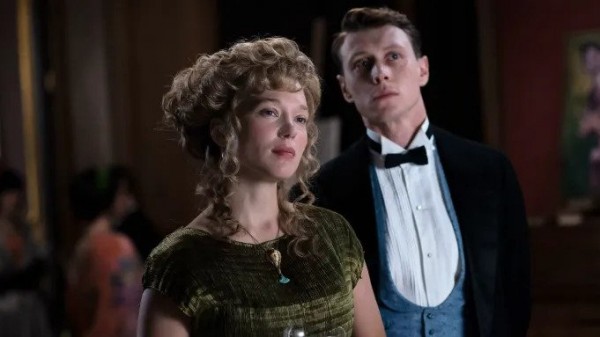
LÉA SEYDOUX AND GEORGE MCKAY IN LA BÊTE
A man (George McKay) and woman (Léa Seydoux) meet across three eras of time and three moods.
Mise-en-scène is class through all eras, the 2044 one, the 2014 one, and the 1910 Paris flood one. The turn of the century dress-up for McKay an Seydoux is a delight to the eye. There is a disaster in a 1910 doll factory that is quite dazzling - both spectacular and elegant and not like anything one has quite seen before. It is the mixture of eras and storylines (all, frankly, rather fragmentary; perhaps fortunately) that lead to a sense of slicing-and-dicing that ultimately is wearying, at least in the setting of a long day of press screenings. This will be a must-see and one to linger over cultishly for Bonello fans (of whom I am one), but may not win a lot of new converts.
Bonello achieves elegance wherever he ventures. All the scenes where Seydoux and McKay are in 1910 dress and have polite, tentative, Last Year at Marienbad exchanges, which dominate the early part of the film, when things haven't become too complicated, are at least eye candy, at best haunting, and, incidentally, would more obviously relate to Henry James, the author of the film's freely riffed-off book.
That theme presents a "beast" as a menacing future that haunts the protagonist, Gabrielle; and in their sci-fi dance toward and away from each other through time Louis (McKay) also is inhibited, desirous and yet holding himself back.
Apparently in 2044 post-apocalyptic Paris - the setting and era that's hardest to follow, Gabrielle (Seydoux) consents to surgery to remove her feelings - and make her more like a robot - and while she's under for this, has flashbacks (that we see) to other lives and experiences.
Because I'm all-in for McKay, the place where I most differ with Jordan Mintzer's critical assessment in his Hollywood Reporter review is in finding McKay's new identity in the last quarter of the film as Louis-something in LA the most "overblown" aspect of all. It creates a quiet menace that's much needed by this last segment of the film, and the depiction of an incel man, whlle blatant, is carried off by McKay with a spot-on impersonation of a messed-up young American. The contrast between McKay's 1910 Paris identity and this one is shocking and thought-provoking. It seems to be what the film is "about," along with Babrielly-Seydoux's identity fluidity-uncertainty. McKay is just right in giving off an air of repressed, intense sexuality. He has a strange, ageless face. He also can look like a boy, which plays well in his scenes as the incel, Louis. The film is built around McKay, and Seydoux's variablity as an actress. She blends seamlessly in each of the three eras.
At the same time I do agree with Mintzer that in depicting a weirdly warped America Bonello doesn't have the knack David Lynch had. Though structurally Bonello is doing something different from Lynch, presumably, one still at moments feels that this is Lynchan territory with not quite the edge.
Still, what a gorgeous, classy piece of weird, disturbing eye-candy. I want to watch it again when I can, to understand it better and wallow in its memorable images. As Minter says, "Bonello doesn’t want us to simply watch The Beast, but to pay attention to it." It's a film that calls for rewatching and rethinking, and it will be better seen without the annoying loud giddy laughter of some audience members at the press screening.
Léa's costar was to have been Gaspard Ulliel, but he died following a ski accident in January 2022.
The Beast/La Bête, 146 mins., debuted at Venice, also showing at Toronto and at the NYFF, as part of which it was screened for this review Sept. 25, 2023. Showing Oct. 8 and 9 at the NYFF, with Bonello for a Q&A. Also to show at London BFI. French theatrical release Feb. 28, 2024. Metacritic rating: ̶8̶3̶%̶.̶ 80%.. AlloCiné press rating 3.7 (73%).
Last edited by Chris Knipp; 04-20-2024 at 10:50 PM.
-
ABOUT DRY GFASSES (Nuri Bilge Ceylan 2023)
NURI BILGE CEYLAN: ABOUT DRY GRASSES (2023)
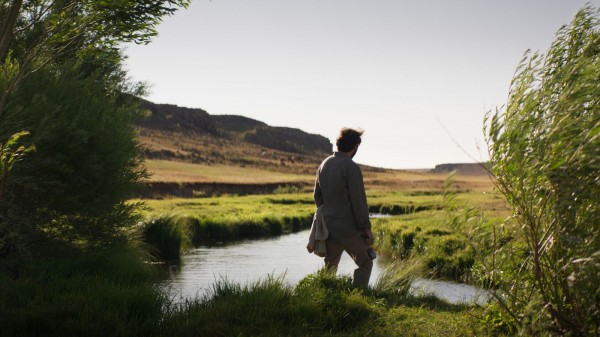
DENIZ CELILOGLU IN ABOUT DRY GRASSES
Teaching in the boonies
About Dry Grasses is even more rich and exciting than Turkish auteur Nuri Bilge Ceylan's other films, and probably more accessible. Typically it settles in, and is in no hurry. The location is the middle of nowhere. The snowy landscapes alternate between scenic and off-putting. The opening shot, all white but for a small van in the middle, is striking, but underlines how overwhelming this landscape is. The middle school teacher protagonist, Samet (Deniz Celiloglu), makes no bones about the fact that he hates the place. Now that he's been here four years he can apply for a transfer and he's hoping for Istanbul. As Samet, Celiloglu is almost a blank slate. He can be nice, obnoxious, sweet, aggressive.
The landscape is off-putting, but the film feels cozy. Interiors are dark and protective-feeling places where people gather continually for ritually prepared and consumed tea and for getting warm, or drunk. Samet is often with his colleague, Kenan (Musab Ekici), who's a bit younger. They start going together to a hill where they get spring water, and during the slow fill-up of their big plastic bottles, have chats.
Samet is a little too cozy and affectionate with his girl students, particularly a tall one with specially thick long brown hair called Sevim (Ece Bagci). He gives her a cosmetic box. He puts his hand on her waist, her arm. He calls her "dear." There is no doubt that this is seriously inappropriate and, in today's world, pretty stupid. And yet it seems harmless, something that goes no further than affection. Except, of course, apart from the fact that particularly in the post-#MeToo world it's dangerous, even actionable behavior, here in the boonies where #MeToo may not have penetrated (but maybe it has: there is cellphone reception, surprisingly), it's wrong because of the effect it will have on Sevim. It will encourage her to develop a crush on her teacher and feel that her crush is returned.
Which evidently happens. But we are not to think the film is all about this. And it gets complicated because it's Samet's (seemingly pointless) refusal to return a mash note seized when the school does a shakedown on both boys and girls, a mash note whose addressee is unknown, but probably him, that apparently angers Sevim and leads her to get her teacher in trouble.
But that's complicated too because Kenin gets hauled in before authorities along with Samet for inappropriate behavior, and seems to be more guilty of it than Samet, something Samet had no idea of.
And before we start to think Samet is a pedophile or Humbert Humbert type, Nuray (Merve Dizdar) emerges - a teacher at another, perhaps better, school who becomes a temporary lover for Samet. Nuray is as fully realized a character in this film whose milieu and people are already very believable. She is the survivor of a terrorist attack which has caused her to lose part of one leg, a fact that is provided in calm detail, even to how the prosthetic limb works and is fitted on. It seems likely Merve Dizdar is disfigured this way in real life, which would make her character especially memorable; in any case she received the Best Actress award at Cannes for her lively, intense performance. Nuray and Samet have a long argument about politics that is the film's most strident moment. One can't help thinking about the two actors memorizing all of this material, which shows this is one place where the intimacy and authenticity flag a bit. Testy intellectual debates like this are a feature of Ceylan films; this one has the virtue of having sexual undertones. "This is Ceylan at his most limber and mischievous, the filmmaking exhibiting a generosity and curiosity that belies the script’s defense of individualist, even isolationist, living, at whatever cost to one’s own happiness," wrote Guy Lodge in Variety, seeming to refer to Samet's part in this debate.
It's hard to convey in a review how rich and beautiful this film is, and it has other facets not yet mentioned, such as the use of still photographic portraits and the classroom scenes, and the scenes of kids playing outside in the snow, which linger in the mind.
It's essential to note that while the controversy over Samet's behavior and his quarrelsome relationship thereafter with Sevim keep on developing elaborately as the film draws to a close - there is no "conclusion" here. This feels like an unusually detalled slice of life, but it may best be seen as one. Instead of a climax, the schol year ends. This provokes a visit to the little closet-like hideaway Samet uses as an office in lieu of the collective faculty room. Maybe this is Nuri Bilge Ceylan's way of saying that things aren't ever as simple as people nowadays like to try to make them.
About Dry Grasses/Kuru Otlar Üstüne, 197 mins., debuted in competition at Cannes winning the Beast Actress award. Screened for this review as part of the New York Film Festival where it shows Oct. 9 and 10, 2023. US theatrical release begins Feb. 23, 2024 at Film Forum, NYC. Metacritic rating: 8̶2̶%̶ now 88%.
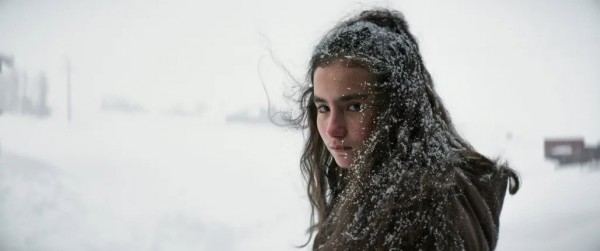
ECE BAGCI IN ABOUT DRY GRASSES
Last edited by Chris Knipp; 03-12-2024 at 11:10 PM.
-
FALLEN LEAVES KUOLLEET LENDET (Aki Kaurismäki 2023)
AKI KAURISMÄKII: FALLEN LEAVES/KUOLLEET LENDET (2023)
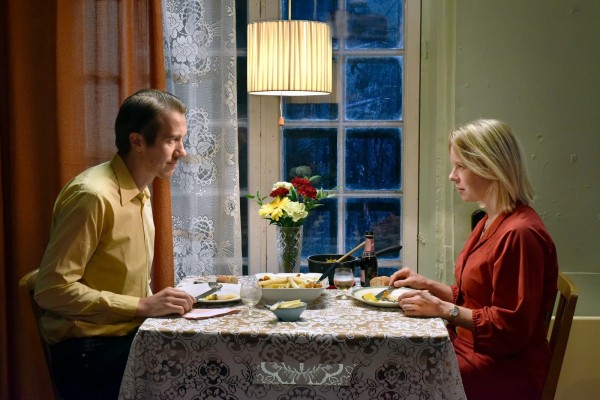
JUSSI VATANEN AND ALMA POYSTI IN FALLEN LEAVES
Two lonely people who meet each other by chance in the Helsinki night and try to find the first love of their lives.
The two people this time are shy, blonde Ansa (Alma Pöysti) and tall, long-faced Holappa (Jussi Vatanen). Both work in factories. Holappa is an alcoholic. The vicissitudes of their tentative, yet somehow determined relationship involve Holappa's reaching a bottom after being fired from a good factory job and then from a not quite so good construction site job and winding up in a halfway house, after which Ansa and Holappa go off, as it were, into the unset. For those familiar with the mechanisms of addiction and recovery, the treatment of this process by Kaurismäki leaves out too much to be of value.
The fairytale simplicity and dry humor that have made Kaurismäki a cinephile delight since the eighties are there. The bright colored images, the somehow engaging dreariness of the urban locations and the karaoke and loud toe-tapping rock and roll music bring the Finnish night to life. But this is a meal that leaves one feeling rather a little hungry, compared to delights like Shadows in Paradise, Ariel, Leningrad Cowboys Go America, The Match Factory Girl, The Man Without a Past, Lights in the Dusk and the more upbeat recent Le Havre and The Other Side of Hope - mainly because of the superficial way Holappa's alcoholism is dealt with, but also a lack of memorable incident. Owen Gleiberman in Variety calls Fallen Leaves "a nice but exceedingly minor movie" that "leaves little imprint." For Kaurismäki devotees this will have to be watched; newcomers should look elsewhere for an introduction to this unique filmmaker. The rapture at Cannes for this film that baffled Gleiberman must be due, we must agree, for the nostalgia that his very consistent style awakens in fans.
The couple's first date goes well as can be expected for two lonely, shy people. After a meal and a film, Holappa asks Ansa for her phone number which she jots on a piece of paper. The paper immediately blows away. They don't know where each other lives and haven't even exchanged names, so they go searching for each other. Holappa stands a long time in front of the retro cinema where they saw Jim Jarmusch's The Dead Don't Die, which she had found hilarious. Ansa waits sadly by her telephone.
Scenes of Holappa show that he is never without a flask and drinks at work and everywhere else, all day long. (Considering this, he seems remarkable free of signs of drinking.) An invitation to dinner chez Ansa is a disaster: it reveals Holappa's heavy drinking to her. She declares that both her father and brother died of alcoholism and she cannot have another drunk in her life. She throws in the kitchen trash the extra table setting she had bought to serve dinner for two.
Through the film there is the thread of music. The first meeting was at karaoke wwhere Holappa was taken by an older friend with a rich baritone voice and a comically exaggerated sense of his own musical talent and prowess with women. Another thread is Russia's war on the Ukraine. Ansa listens to news of it on an old fashioned looking radio on her kitchen table, then shuts it off. A modern note in Kaurismäki's unchanging world is acknowledgement of the existence of computers with internet. Ansa rents the use of one for ten euros a half hour to look for work after being fired from her grocery store job for giving expired food to a homeless person. (No good deed goes unpunished.)
But in Kaurismäki the humble working class drones whose fates are depicted with deadpan tenderness hold out some kind of hope, and the simplicity of the style is a reassuring gesture toward better days. Peter Bradshaw noted that he found himself "rooting for the hero and heroine" in Fa hllen Leaves "in an uncomplicated way" that he hadn't "for any other film at Cannes," and that is another way of seeing how festivals still welcome this movie despite it's not being up to his best. But for me the obstacle to my previous admiration for his work is the too-easy solution to Holappa's alcoholism. This time the director has bitten off more than he can swallow without chewing.
Fallen Leaves/Kuolleet Lendet, 81 mins., debuted at Cannes May 23, 2023. It was screened for this review as part of the New York Film Festival. Metacritic rating: 7̶9̶%̶ 86% (3/14/2024). In France the AlloCiné press rating is 4.1 (=82%).
Last edited by Chris Knipp; 03-14-2024 at 02:22 PM.
-
THE SHADOWLESS TOWER 白塔之光 (zhang lu 2023)
ZHANG LU: THE SHADOWLESS TOWER 白塔之光 (2023)
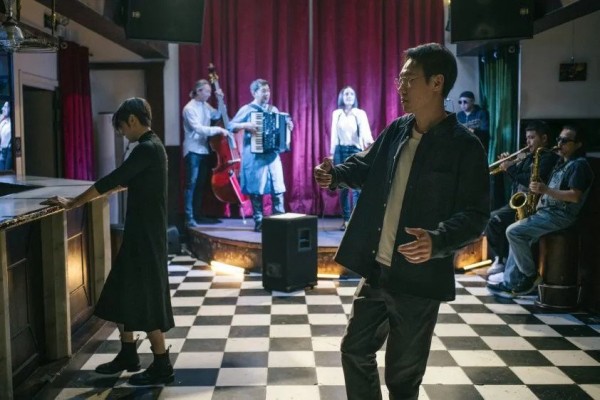
YAO HUANG, XIN BAIQING IN THE SHADOWLESS TOWER
Slow developer
The Shadowless Tower is an ambitious film, striving for a novelistic complexity through a rambling, episodic structure on a limited budget. The writer-director Zhang Lu is Korean-Chinese and grew up in China's Yanbian Korean Autonomous Prefecture, which partly borders on North Korea and Russia. The main character here, however, is thoroughly Chinese in culture and speaks Mandarin but can be amused by Cantonese. Formerly a writer and academic, Zhang Lu was led by film success in the 2000's to become a full-time director. The main action is set in contemporary Beijing, where the ancient "shadowless tower, " a Yuan Dynasty White Pagoda, is a symbol of stability for the protagonist - a middle-aged food critic, divorcee and former poet, Gu Wentong (Xin Baiqing). Preparing an article on a small traditional restaurant, Gu is assisted (evidently not for he first time) by a young woman photographer with the odd name of Ouyang Wenhui (Yao Huang) - a cute gamine type, a little like Faye (Wong) in Wong Kar-wai's Chungking Express with an extra fuck-you vibe. She continually challenges and mocks Gu but he likes it.
Gu may be much older than the girl but he's tall, cuts a good figure, and is a good dancer. His flaw is to be excessively polite, allegedly the cause of his divorce. Ouyang Wenhui is drawn to him and they go on various jaunts.
More of Gu's food critic work might have been interesting; so, of course would be more depth in exploring this odd couple. But as David Rooney says in his review of this film for The Hollywood Reporter, Zhang's people are cut off, "orphaned, disconnected, separated from the roots that give them an emotional and spiritual mooring." Both Gu and his father, Gu Yunlai (Tian Zhuangzhuang), from whom he has been cut off for decades, live alone in small rooms. Since this is the case, the film can't develop any relationships in much depth; it only plots the belated beginnings of them.
Gu also has a small daughter whom he sees regularly. He has arranged, with his wife's consent, for the six-year-old to live with his sister and her husband. She is a smart bundle of joy (known as "Smiley") and leaps into his arms, challenging him (like xOuyang Wenhui?) and showing off - in short, a powerful distraction. The opening sequence - it takes thirty-two minutes to get to the opening title - is a visit to his mother's grave with his daughter, sister, and brother-in-law. Yes, Gu is cut off from his family, just not out of touch with them. He is leading up to finally seeing his father, an old man, of course, who likes to fly kites alone on the beach, an amusement he began at thirty with his son, now practiced alone.
There is a strange scene where Ouyang Wenhui and Gu rub together affectionately standing in a crowded bus, when that is interrupted by a furor over a inappropriate touching of a women by a man who is chased and caught. Ouyang Wenhui and Gu get off and he reveals that his own father was punished for such an act years ago, and in the aftereffect of that, his mother cut off relations with him and he was never seen again. In the aftermath of his mother's death Gu is led to seek out his father after so many years.
Gu has learned that his father has long lived in Beidaihe, a resort town, but working as an "abacus man" (an accountant), he made it a practice twice a year to ride a bicycle - he eschews public transportation - on the long 300-km. distance from there to Beijing to see his two children. His brother-in-law has stuffed a piece of paper into Gu's hand with his father's phone number on it, and this is when he starts calling it from pay phones, but not speaking.
This film about disconnectedness contains neat connections. A link-up with the Yuan Dynasty White Pagoda, comes when Gu's new young girlfriend books a room for them in a hotel that adjoins it. She also connects with both him and his father because he effectively lost his dad at age five, the time when his father was banished by his other. She was orphaned and adopted at age five from Beidaihe, and that is where his father has been living. It's a natural for the girl, who still identifies with Beidaihe despite being raised elsewhere, to go to Beidaihe with Gu [I ]fils[/I] for her to revisit her place of origin and for him to reconnect with his father. To describe this makes it sound contrived, but the plot line unfolds in a way that feels offhand, a process of discovery.
Rooney calls this film a "minor-key drama" and says it's "too muted and elusive to break beyond festivals," but admits that its "melancholy spell" nonetheless "stays with you." It's cunningly but also confusingly constructed; better to watch it twice, or after careful study of a plot summary or press kit. It's interesting, but I can't recommend it to everyone. I will recommend it to any fans of contemporary Chinese film and followers of Asian film festivals. There, Zhang Lu will be a name to watch for.
The Shadowless Tower 白塔之光, 134 mins., debuted at the Berlinale.; also Hong Kong, Shanghai, Beijing and El Gouna (Egypt). It was screened for this review as part of the New York Film Festival where it shows Sept. 30, a North American premiere including an Q&A with Zhang Lu.
Last edited by Chris Knipp; 02-27-2024 at 12:39 PM.
-
IN OUR DAY 우리의 하루 (Hong Sang-soo 2023)
HONG SANG-SOO: IN OUR DAY 우리의 하루 (2023) (2023)
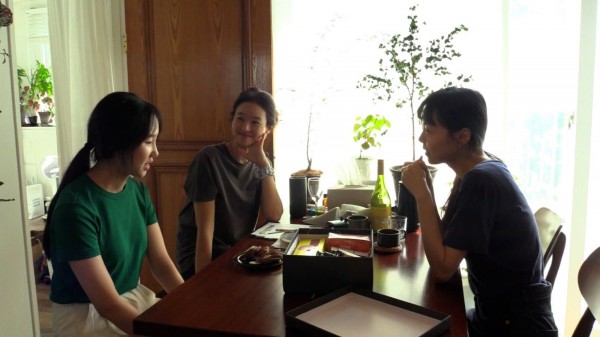
PARK MISOO, SONG SUNG-MI AND KIM HIM-HEE IN IN OUR DAY
Short scenes going back and forth between two situations
A Cannes review calls this film "less substantial and approachable" than the prolific Korean auteur's The Novelist's Film and Walk Up from last year, and called this one "fragile" and "fragmentary." All honor to those Hongists who in the press and intensity of a film festival can find the leisure and calm to contemplate this collection of short episodes in the light of the œuvre and make sense of it, and turn its minimalism and outright silliness and superficiality into profound meaning and art. This writer has tended to come up a bit short.
The spisodes are various. In the first, several women admire and feed treats to a cat and talk about acting as a profession. They are Sangwon (Hong muse Kim Min-hee, an actress who has been out of the country and has lost interest in aacting, and her hostess, Jung-soo (Song Sunmi), whose furry cat "Us" she is admiring. The third woman who comes in later is Sangwon's cousin Jisoo (Park Misoo), who has recently made the decision to focus on an acdting career. Much time is spent on the cat, whom Sangwon over-feeds treat pellets.
In another segment, a grey-bearded poet, Hong Uiji (Ki Joo-bong) talks to a young man, Jaewon (Ha Seong-guk), who has come to interview him while being filmed by a female a arts student, Kijoo (Park Miso)Th. He is having a hard time obeying orders from the doctor due to a heart ailment. He was known for smoking and drinking a lot and now he must give up both alcohol and cigarettes. He and the young interviewer exchange philosophical generalizations.
These two segments are connected through rhyming moments - climbing into single beds, guitars, and consuming ramyen with added red pepper hot sauce, declared to be a delicacy (while the relative lack of nutritional value of ramyen compared to other foods is noted.
Jonathan Romney in his Screen Daily review notes that in Hong sometimes the slightest episodes yield up interpretive riches; that he is playing with structure like a minimalist poet; that the title has no clear explanation except that the segments may all take place in a single day, and that the role of poetry - perhaps diminished - "in our time" is under consideration in the scenes with the poet-sage Hong Uiji.
There are thoughts about life here when the poet and young seeker converse. Also among the actors and would-be actors there arise big questions about art, questions of performance, reality and self-knowledge. These things are deemed to replace an actual plotline, since less is "happening" in the traditional screenplay sense in this film than normally, even for Hong. Nonetheless, devotees will delight in whatever they find here. Skeptics - among whom I count myself at the moment (though I've been all-in for Hong in the past) are more likley to feel this is a sign the Korean auteur ought to cut back on production, and wait till he has more solid material to film. Sometimes a snoert time can seem a long time and sometimes a long time can pass quickly, when it comes to film. For me the reliance on improvisation for material of such slight content led to moments of supreme vapidity.
In Our Day 우리의 하루, 83 mins., debuted at Cannes Directors Fortnight; also Hamburg, Busan, a Paris premiere, and the New York Film Festival, where it was screened for this review. Walter Reade Theater Oct. 11 & 12, 2023.
Last edited by Chris Knipp; 10-21-2023 at 03:57 PM.
-
IN WATER 물안에서 (Hong Sang-soo 2023)
HONG SANG-SOO: IN WATER 물안에서 (2023)

Hong's second film for 2023, 61 mibutes, and intentionally out of focus. A young filmmaker prepares to shoot at an off-season island retreat. Debuted at Berlin.
Last edited by Chris Knipp; 09-24-2023 at 08:52 PM.
-
RADU JUDE: DO NOT EXPECT TOO MUCH FROM THE END OF THE WORLD (2023)

Another tirade from he Rumanian author of the timely and entertaining but scattershot filmmaaker of Bad Luck Banging or Loony Porn (2021). (Locarno.)
Last edited by Chris Knipp; 09-18-2024 at 06:35 AM.
 Posting Permissions
Posting Permissions
- You may not post new threads
- You may not post replies
- You may not post attachments
- You may not edit your posts
-
Forum Rules





 Reply With Quote
Reply With Quote







Bookmarks